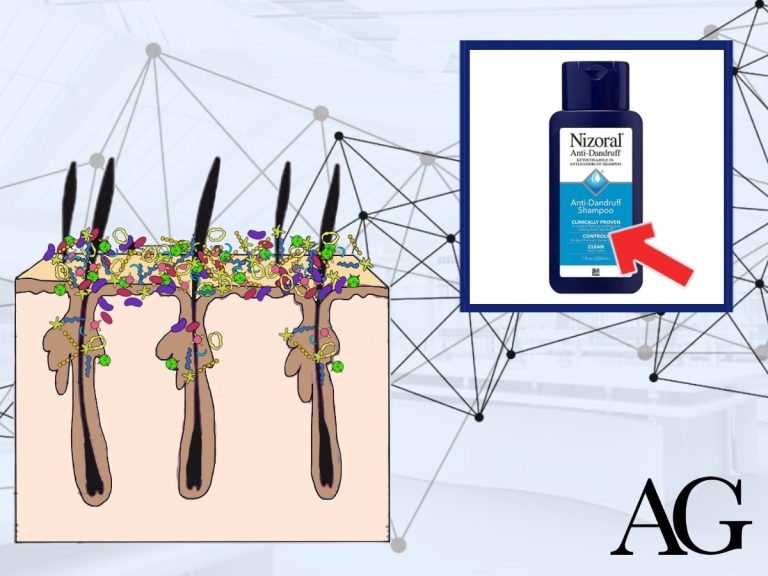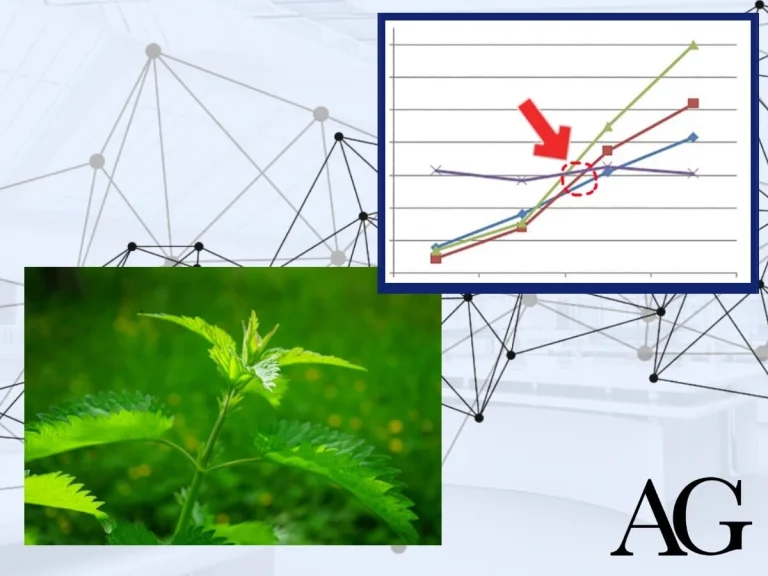Biotin pills, gummies, shampoos and topicals marketed for hair health have infested every corner of the hair loss industry. I mean, biotin-infused products seem to be everywhere! Why does there seem to be an obsession with biotin amongst hair loss companies? Does Biotin even help prevent hair loss?
For instance, here’s a top selling biotin supplement on Amazon marketed for ‘hair growth’. Some people seem to love it. Others claim it makes ‘no difference’.

In this article we’ll explain why Biotin is indeed an important vitamin for hair growth. We’ll also explain why this vitamin is severely over-hyped and does not warrant the gargantuan $100+ million per year supplement sales figure.
What is biotin?
Biotin (also known as Vitamin H or Vitamin B7) is a type of B-vitamin. It is found in foods such as meat, fish, eggs, bananas and more.
The molecular structure of Biotin can be seen below.
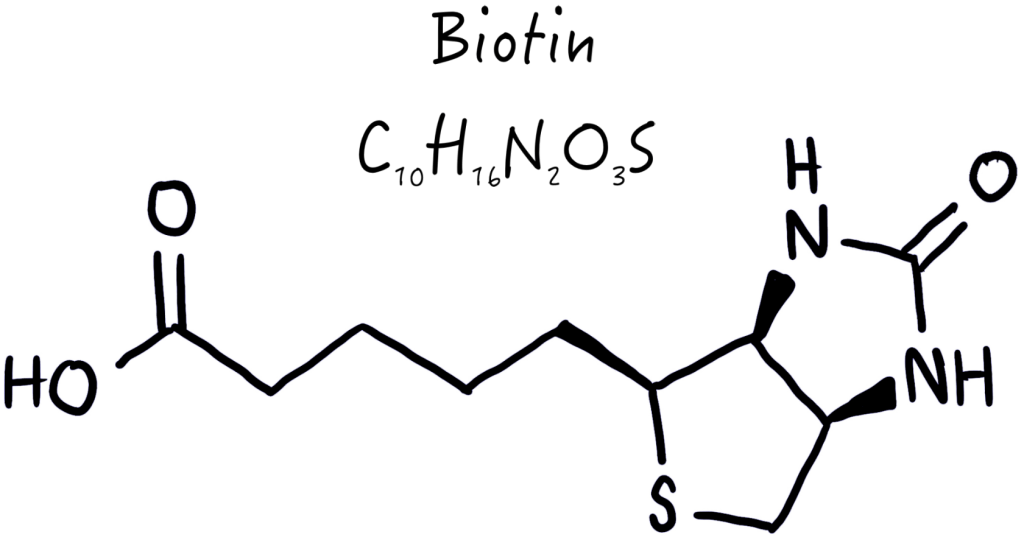
Biotin plays a crucial role in a plethora of bodily functions. For instance, Biotin helps you1:
- Convert food into energy (metabolism)
- Maintain nail, skin and hair health.
- Support liver and immune function. More than 2,000 biotin-dependent genes have been identified in human lymphoid and liver cells.
- Produce energy. ATP (Adenosine Triphosphate) is the main energy carrier ion cells and biotin helps produce this.
- Gene expression. Some genes remain dormant while others express heavily depending on environmental factors. Biotin helps the body navigate genetic expression.
To steal a line from Eminem in ‘Rap God’, having no biotin means “We’re in trouble, big trouble”. Biotin is crucial for us to function healthily.
How does biotin support hair growth?
1. Energy production
As mentioned, Biotin plays an important role in various metabolic processes in the body. In other words, biotin helps convert food to energy.
By supporting glucose synthesis and the metabolism of carbohydrates, biotin helps to ensure that the body has a steady supply of energy for various functions, including cell proliferation in the germinal matrix, which is how hair grows!

Admittedly, this link of Biotin to hair loss is a bit vague. Yes, Biotin is needed for energy which in turn is needed for hair har growth. But you could say this about anything. For instance, breathing is required for energy which in turn helps hair grow (and also keeps us alive!).
2. Keratin production
Biotin is also essential for your body to produce keratin, a protein that makes up skin, nails and….and….hair!! The cortex and cuticle of each hair shaft are largely comprised of keratinised cells.
Without sufficient biotin, people can experience a reduction in keratin production and therefore, less of it will be made available for hair growth. Needless to say, this can lead to impaired hair growth…no bueno.
This is how biotin helps produce keratin:
- Biotin is absorbed by the body through the small intestine and transported to the liver.
- In the liver, biotin is converted into its active form, biotinyl-AMP, which is then used to activate the biotin-dependent enzyme, acetyl-CoA carboxylase.
- Acetyl-CoA carboxylase is involved in the synthesis of fatty acids, which are the building blocks of keratin.
- Biotin also plays a role in the metabolism of amino acids, which are the other building blocks of keratin. Specifically, biotin is necessary for the activity of enzymes involved in the breakdown of certain amino acids, such as leucine and isoleucine, into smaller molecules that can be used for the synthesis of other amino acids and ultimately, proteins.
Where do we get Biotin from?
Gut bacteria
Your gut is populated by trillions of bacteria. These bacteria are essential and help you maintain your immune system, regulate digestion and metabolism and much more.
Certain strains of intestinal bacteria like Bacteroides fragilis, Prevotella copri, Fusobacterium varium and Campylobacter coli can all produce Biotin as a byproduct of digesting food particles. This Biotin is then distributed around the body2.
Foods
Biotin is found in many foods. Animal products such as the following contain substantial amounts of biotin:
- Red meats
- Organ meats
- Sardines
- Eggs (Cooked! Raw egg-white contains a large amount of avidin, which binds to Biotin and prevents its absorption in the gut)
- Salmon
Biotin is also found (although in more moderate quantities) in foods such as:
- Avocados
- Nuts. Particularly almonds, peanuts, pecans, and walnuts
- Bananas
- Mushrooms
- Cauliflower
- Legumes
Naturally, Biotin is also available in supplement form.
Not all natural sources of food are equal. Some are more bioavailable that others3. Biotin comes in two forms. Protein-bound and free forms. Protein bound biotin is digested into free biotin and then absorbed in the small intestine.
The daily recommended intake of Biotin for adults in 30mcg4. In western populations, the estimated daily intake is about 35-70mcg.
Delving into the studies on biotin and hair loss
Study 1 – A Review of the Use of Biotin for Hair Loss
This 2017 literature review analysed 18 separate scientific studies on the use of Biotin for hair loss. This review concluded that “there is limited research to support the utility of biotin in healthy individuals.”
How could they have come up with such a conclusion?
At face value, all 18 studies showed favourable hair growth results after supplementing with biotin. However, when you actually read the studies, you find out that:
- 15/18 studies were performed on patients with a disease or genetic mutation that prevented them from absorbing dietary biotin. In most cases this was a Biotinidase deficiency. Biotinidase is an enzyme that helps the body use biotin.
- Out of the 3/18 studies where the patients did NOT have a genetic mutation, none of the patients reported hair loss. They merely reported “uncombable hair syndrome” which is characterised by dry hair with a tangled appearance.
- All 18 studies were performed on children under 6 years old.
And these are the studies that are being linked to by biotin supplement companies. I’m not kidding.
If you are a child with a genetic mutation that prevents you from absorbing biotin normally, then there is strong evidence that biotin supplementation can work wonders for you. If you are an adult with patterns baldness, a biotin supplement will likely do little to no good.
Study 2 – Serum Biotin Levels in Women Complaining of Hair Loss
In 2016, a study sought to identify the prevalence of biotin deficiency amongst women. Out of 541 women with self-perceived hair loss, 38% of them were classed as deficient in biotin (<100 ng/L). 13% of the women were classed as having optimal biotin levels (>400 ng/L).
A few things to note:
- 62% of women with self-perceived hair loss did NOT have a biotin deficiency. This means that hair loss can absolutely happen even in the absence of a biotin deficiency.
- Out of the women who were classed as deficient in biotin, 11% of them had health issues that increased their chance of developing a biotin deficiency (versus 1.5% in the group with optimal biotin levels). These factors include inflammatory bowel disease, isotretinoin, antibiotic and antiepileptic treatments.
A subset of the women from both the biotin-deficient and biotin-optimised groups underwent trichograms.
A trichogram is an examination of the scalp using a highly magnifying tool. This allows for a close-up analysis of the scalp in order to determine anagen to telogen ratios, hair diameters, scalp conditions like flakiness and inflammation and more. It is a test that helps determine someone’s type of hair loss.
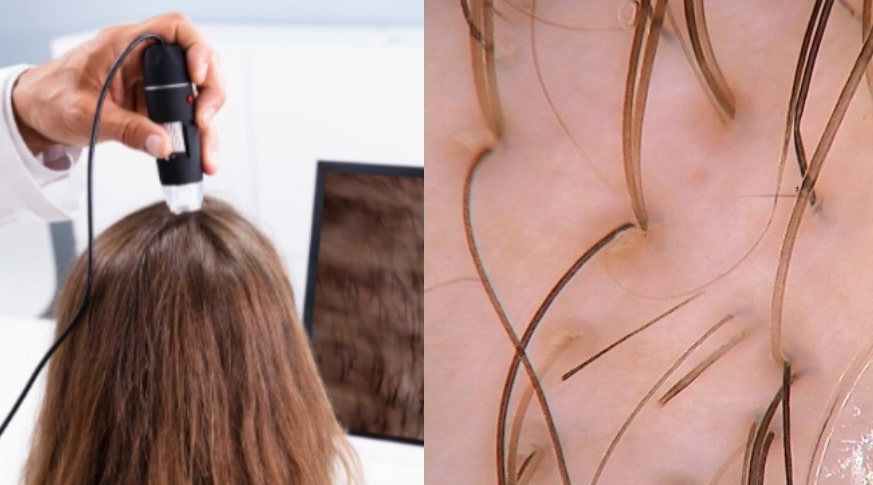
What did these trichograms reveal?
- 24% of women in the biotin-deficient group showed signs on telogen effluvium (hair shedding)
- 24% of women in the biotin-optimised group also showed signs on telogen effluvium
- The other women showed no clinically diagnosable signs of hair loss.
One of the study interpretations of these results is that hair loss diagnosis occur in equal rates for women with poor and optimal biotin levels and therefore, marginal biotin deficiencies have little correlation with hair loss.
I’ll leave you with these two conclusions by the study author:
- “The neurological and psychological symptoms [of a biotin deficiency] can occur with only mild deficiencies while dermatitis, conjunctivitis, and hair loss generally occur only when deficiency becomes more severe.”
- “The custom of treating women complaining of hair loss in an indiscriminate manner with oral biotin supplementation is to be rejected unless biotin deficiency and its significance for the complaint of hair loss in an individual has been demonstrated.”
Study 3 – Biotin Deficiency in Telogen Effluvium: Fact or Fiction?
Let’s have a look at one last study to determine the influence of biotin deficiencies on hair shedding.
In 2020, a group of 60 patients with telogen effluvium (a hair shedding disorder you can read more about here) were compared against 20 patients without telogen effluvium.
Turns out, all patients experiencing hair shedding had optimal levels of biotin. There was no statistical difference in biotin levels between those experiencing hair loss and those who weren’t.
Slightly lower biotin levels were found in patients who were elderly patients, smokers, athletes, those who had a history of recurrent infections, and women who were pregnant and/or lactating.
But it bears repeating, all hair loss sufferers had optimal biotin levels.
The study concluded that “there was no significant difference in serum biotin levels between cases and controls or between those with acute or chronic telogen effluvium….This study also stands against prescribing biotin supplements to all cases of hair loss without a confirmed biotin deficiency, as it might expose certain people to potential harm.”
How common are biotin deficiencies?
Whilst we don’t know exactly, it appears to be quite rare. Certainly, through both diet and our own guts production of biotin, most people get enough of it 3.
There are certain factors that can increase the likelihood of a biotin deficiency. These include:
- Pregnancy
- Lactation
- Alcohol abuse
- Antibiotic abuse
- Smoking
- Genetic deficiency in biotinidase enzyme
- Accutane (Isotretinoin) use
- Gastrointestinal disease.
- Anorexia
These factors can cause accelerated biotin breakdown, prevent biotin absorption, increase the biotin intake requirement or damage our bacteria’s ability to produce biotin. As such, if you have hair loss and match any of the above listed factors, you may want to consider a biotin test.
Having a biotinidase deficiency is an edge-case where a biotin supplement can make a significant difference to hair growth. A biotinidase deficiency results in obvious symptoms in the first few months of life. In fact, most people with a biotinidase deficiency will have this diagnosed at birth.
If you have this deficiency, chances are you already know about it.
Should you supplement with biotin?
It’s clear that biotin plays a crucial role in the growth of our luscious locks. Does that mean we should all rush to throw money at biotin supplements at the first sign of balding? Probably not and here’s why…
Biotin is a water-soluble vitamin, which means that it is not stored in the body and needs to be consumed regularly through the diet or supplements to prevent deficiency.
For those with a biotin deficiency, supplementing with biotin can work wonders. However, most people experiencing hair loss do not have a biotin deficiency. Hair loss as a result of a biotin deficiency is extremely rare. The rarity of this deficiency does not warrant the boundless amounts of biotin supplements.
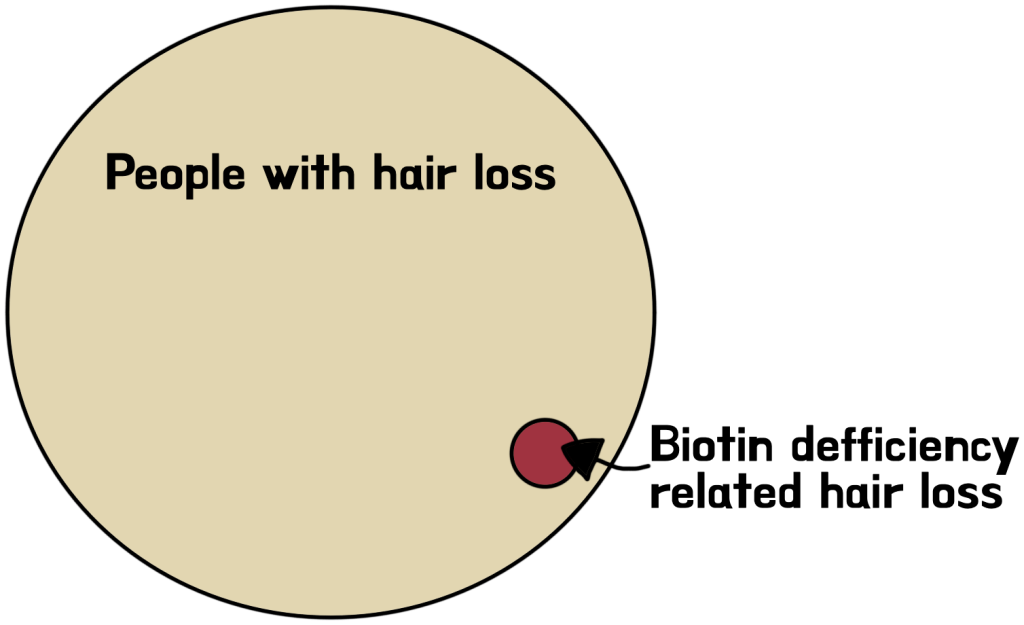
A biotin supplement in most cases is like pouring water into a cup that is already full. It’s not solving anything..
If a biotin deficiency is indeed the cause (or a partial cause – it is possible your hair loss is driven by multiple factors), then by all means, a biotin supplement may be appropriate. However, in most cases, supplementing with Biotin simply isn’t addressing the root problem of hair loss, therefore making biotin supplementation irrelevant.
Does biotin have side effects?
Biotin is generally considered safe and non-toxic. Since biotin is water-soluble, excess unused biotin is typically excreted out rather than accumulate in body tissue.
However, as with most things in life, you can have too much.
One potential side effect of high-dose biotin supplementation is skin rash or acne. This is thought to be related to the fact that biotin can stimulate the production of sebum, an oily substance produced by the skin that can contribute to acne breakouts. Some people may also experience gastrointestinal symptoms such as nausea, diarrhoea, or cramping when taking high doses of biotin.
Excess biotin can also interfere with the measurement of thyroid hormone and troponin (a protein used to diagnose heart attacks).
The FDA mentions that “many dietary supplements contain biotin levels up to 650 times the recommended daily intake of biotin. The presence of high levels of biotin in patients’ blood can cause clinically significant incorrect results in certain lab tests, leading to falsely high or falsely low results, depending on the type of test.”
This can lead to people getting wrong diagnosis and consequently given wrong treatments. This is serious shit. So serious in fact, that someone died because of a biotin-caused false laboratory test.
Conclusion
Complete absence of biotin in your diet will likely lead to hair loss. Most people experiencing hair loss do not have a biotin deficiency and therefore, increasing their biotin intake via supplementation will not help slow down or reverse their hair loss. Even for those with moderate biotin deficiencies, it is unclear wether how much biotin supplementation will help. This is because the more dramatic effects of the deficiency (hair loss) are seen when the deficiency is more extreme (rather than in the milder deficiencies which are more commonplace).
If you are severely malnourished or suffer from any of the biotin deficiency exacerbating factors mentioned above, then it might be worth getting your biotin levels tested. If you are deficient, a biotin supplement may help you keep hair loss under control. Otherwise, your chances of having biotin-related hair loss are miniscule.
This is why I believe the biotin supplement industry is largely built on a false economy that preys on consumers’ insecurities. Fortunately, you now know not to get fooled!
Ultimately, it pays to understand the reason(s) for your hair loss. These reasons may be different to other people with hair loss.
While someone may experience hair loss due to a nutritional deficiency such as iron, another person may have an endocrine disorder (e.g., thyroid disorder) or elevated androgens as the underlying cause.
Once you have understood why you are losing your hair, you are in a much better position to start saving it and can avoid wasting time and money on supplements that simply won’t do anything for you.

